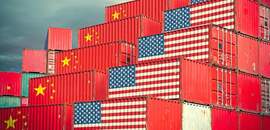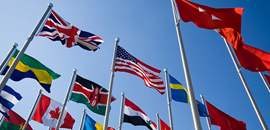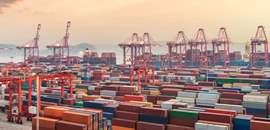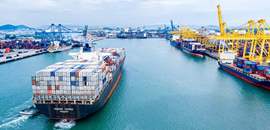- Notwithstanding adverse political news at home, the Trump rally has continued amid favorable economic news and investor optimism about pending corporate and personal income tax cuts. Diminished tensions between the Trump Administration and China have also lessened the risk of a trade war.
- The key event was President Trump’s reaffirmation of the “One China” policy to President Xi in a telephone exchange earlier this month. At the same time, Defense Secretary Mattis talked about the need for a diplomatic rather than military solution to the dispute in the South China Sea, which the Foreign Ministry in China welcomed.
- With Steve Mnuchin assuming the helm as Treasury Secretary, market participants are awaiting the stance the Treasury will take on whether to declare China a “currency manipulator.” Press reports suggest the Trump Administration may change tactics, so that China is not singled out.
- The bottom line: The risk of an escalation in tensions between the U.S. and China has lessened, and it appears moderates in the Trump Administration are calling the shots. Nonetheless, circumstances could change if the dispute in the South China Sea heats up or if China’s trade surplus with the U.S. were to increase.
President Trump Moderates His Stance on China
At a time when the Trump Administration has been engulfed with a series of adverse political developments, market participants appear oblivious to them, and the so-called Trump rally lives on. The principal reasons are that news on the economic front has been favorable, consumer and business confidence readings remain high, and investors are focused on the prospect for significant cuts in both corporate and personal tax rates.
In addition, a potential negative factor — namely, the prospect for a trade war between the U.S. and China — has also diminished recently. The key development was a sudden reversal in President Trump’s stance toward China. Throughout the presidential campaign, Mr. Trump took a hard line on China, claiming that its trade policies were unfair, and on several occasions he called for imposing tariffs of 35% on Chinese imports into the U.S. Immediately after assuming office, President Trump upped the ante by congratulating the leader of Taiwan and by indicating he was open to reviewing the One China policy that China’s leaders regard as non-negotiable.
During the past month, however, the Trump Administration has softened its stance considerably. In a telephone conversation with China’s leader, Xi Jinping, the President retreated from his earlier statement, and he indicated the White House had agreed to honor the One China policy “at the request of President Xi.”
The timing of the call was significant, coming just before President Trump met with Japanese Prime Minister Shinzo Abe to discuss the commitment of the U.S. to East Asia. It also coincided with a trip to Japan and South Korea by Defense Secretary Mattis, during which he talked of the need for a diplomatic rather than military solution to the dispute over islands in the South China Sea. The Foreign Ministry in Beijing welcomed the remarks and the Chinese press called them a “mind-soothing pill” that “dispersed the clouds of war.”1
Looking behind the scenes, these developments suggest that moderates in the Administration such as Secretary of State Rex Tillerson, Defense Secretary James Mattis, and National Economic Council Director Gary Cohn are calling shots on China policy for the time being. This is reassuring to those who worried that Peter Navarro, Wilbur Ross, and Robert Lightziger, who have a more protectionist bent, could be in charge of trade policy.
Is China a Currency Manipulator?
With Steven Mnuchin now confirmed as Treasury Secretary, market participants will now be watching to see whether the Treasury declares China to be a “currency manipulator,” as Mr. Trump suggested during the presidential campaign. Since 2015, the criteria that the Treasury has used for making such a designation has been three-fold: (i) the country has a large current account surplus, defined to be in excess of 3% of GDP; (ii) it has a large bilateral trade surplus with the U.S.; and (iii) it intervenes in the currency markets to weaken its currency versus the U.S. dollar.
Based on these criteria, China meets only one condition — namely, it has a large bilateral surplus with the U.S. Its overall current account surplus, by comparison, has fallen steadily over the past decade, and is currently less than 3% of GDP. And while the Chinese authorities intervene regularly in the foreign exchange markets, since 2014 they have been primarily sellers of U.S. dollars. The reason: China has experienced massive capital flight that far exceeds its currency account surplus, and the authorities have been trying to limit the depreciation of the RMB versus the dollar.
Weighing these considerations, the Treasury in the past has refrained from declaring China to be a currency manipulator. If it were to do so now, the rationale would be political rather than economic. Even then, it is unlikely the Trump Administration would want to escalate the issue at this time when it already has moderated its stance.
A recent Wall Street Journal article (February 14, 2017) stated that the White House is exploring a new tactic to discourage China from undervaluing its currency. Under the plan the Commerce Secretary would designate the practice of currency manipulation as an unfair subsidy, without singling out China, and U.S. companies could then bring complaints to the Commerce Department. While this tactic is in keeping with the stance adopted by previous administrations, Chinese officials reportedly are bracing for an unprecedented number of trade disputes, and they are considering possible retaliatory actions.
Avoiding a Full Scale Trade War
Both the United States and China for the time being are seeking to avoid a full scale trade war that would produce a “lose-lose” situation. Investors, nonetheless, must consider the possibility of such an outcome in the future, especially if China’s bilateral trade surplus with the U.S. were to widen, while the RMB would weaken further against the dollar.
The latter outcome remains a distinct possibility for two reasons. First, U.S. import demand is likely to surge if the U.S. economy continues to gain traction, and imports from China would in turn be boosted. Second, a stronger economy is likely to bring the Fed into play, and a widening in interest differentials between the U.S. and China would place added pressure on the RMB. In these circumstances, the Trump Administration could very well come down on the side of those who contend China is manipulating its currency, even if the Chinese authorities intervene to limit the depreciation of the RMB.
In these circumstances, markets are likely to focus on whether any sanctions imposed by the U.S. are targeted to specific items or are broadly based and severe. In the former case, markets would likely take the news in stride, as there are numerous instances in which the U.S. has imposed sanctions on select items. However, if the Trump Administration were to up the ante by imposing broad-based sanctions — including high tariffs across a wide range of goods — markets would likely sell off, as investors would anticipate retaliation by the Chinese authorities and other countries that are affected.
Our assessment is the risk of a full scale trade war has lessened for the time being. However, political developments such as a widening in the dispute over islands in the South China Sea or adverse developments in the U.S. could result in an escalation of trade tensions at some point. In this respect, the risk of a trade war cannot be ruled out entirely.
1 Goldman Sachs report “Top of Mind,” February 6, 2007.



















